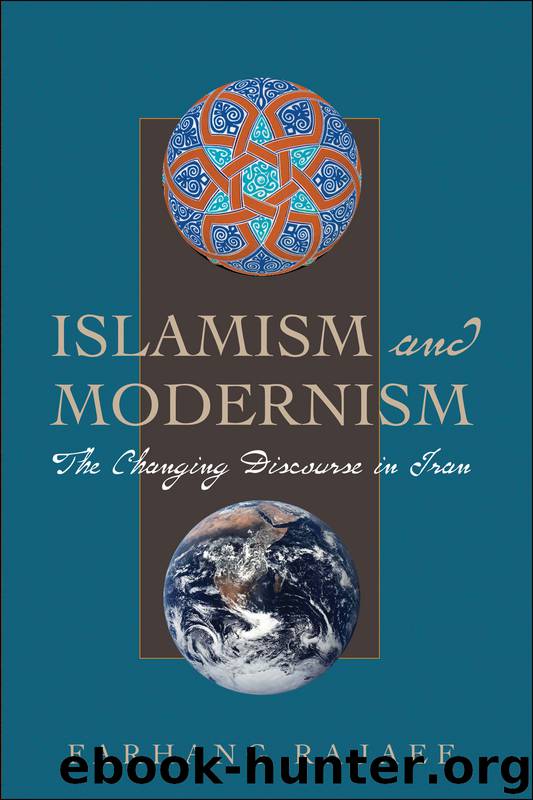Islamism and Modernism by Farhang Rajaee

Author:Farhang Rajaee
Language: eng
Format: epub
Publisher: University of Texas Press
Published: 2007-03-16T16:00:00+00:00
In an important lecture entitled “How to Be,” Shari‘ati talked about Islam as a wave, a calling, and a social mission (resalat-e ejtema‘i). He even interpreted “nation” in verse 143 of Chapter 2 of the Qur’an, in which God says, “And thus We have made you a medium nation,” to mean “a group that is involved in the heart of time … and the battles of intellectual and social interactions and forces” (2:16). This was quite different from most previous interpretations, which had suggested that the term meant either “a just nation” or a nation “in the middle of Christians and Jews.” And for him, “the heart of time” referred to the age of man’s struggle for justice: “Time in our philosophy of history begins with struggle and ends with struggle (from Abel to the Imam of the Age [the Mahdi in Shi‘ism]). … [And] our philosophy of history is based on the contradiction between good and evil and the struggle of the two poles ‘oppressor-oppressed,’ ‘God-Satan,’ ‘monotheism-associationism,’ and ‘tyranny-equity’” (2:223). His version of Islam would make possible the implementation of this struggle. It was “a calling, a mission, a commitment, a responsibility, and a struggle for the people.” It would lead to “equity, justice, welfare, and the elevation of humanity” by means of the “government of consensus, consultation, and covenant” (7:70–71). This version corresponded to the human needs of love, freedom, and equality, or, as he put it, the triad of “God, freedom, and equality” (2:61).
Liberalism had successfully guaranteed freedom but not equality. Socialism had guaranteed equality but not freedom, and both had ignored God. Shari‘ati felt that his version of Islam provided the best remedy because it guaranteed all three (2:87–90). As for the best way to implement his version, Shari‘ati emphasized the notion of struggle, or jihad, which, he insisted, “has been forgotten and left in the pages of history books” (6:12).14 Indeed, he suggested that jihad constitutes the most sacred dimension of Islam. He claimed that the Prophet had said, “Every religion has a sacred dimension and that of mine is struggle” (2:10). It is this sacred dimension that needs to be revived. As discussed, Shari‘ati felt that Shi‘i leaders such Ali and Hossein were the best models to follow because not only did they embody the three dimensions of freedom, equality, and love, but their lives were also examples of struggle and jihad.
The irony of Shari‘ati’s effort is that although he was fighting clericalism in Islam, he paved the way for the clergies to participate in the public sphere. One of his works, Ummat and Immat (The Community and Leadership) (26:461–634), did the most damage. Mehdi Bazargan commented that more than any other work, this one helped consolidate Khomeini’s position as the leader of the movement (Bazargan 1988, interview). In this pamphlet, Shari‘ati forcefully argued for the necessity of a leader if there were to be a revolution. Although he also argued in support of the compatibility of democracy and Islam, he did not advocate this for Muslims or particularly for Iran (26:599–600).
Download
This site does not store any files on its server. We only index and link to content provided by other sites. Please contact the content providers to delete copyright contents if any and email us, we'll remove relevant links or contents immediately.
| Elections & Political Process | Ideologies & Doctrines |
| International & World Politics | Political Science |
| Public Affairs & Policy | Specific Topics |
| United States |
The Secret History by Donna Tartt(19041)
The Social Justice Warrior Handbook by Lisa De Pasquale(12185)
Thirteen Reasons Why by Jay Asher(8887)
This Is How You Lose Her by Junot Diaz(6874)
Weapons of Math Destruction by Cathy O'Neil(6263)
Zero to One by Peter Thiel(5786)
Beartown by Fredrik Backman(5737)
The Myth of the Strong Leader by Archie Brown(5496)
The Fire Next Time by James Baldwin(5429)
How Democracies Die by Steven Levitsky & Daniel Ziblatt(5211)
Promise Me, Dad by Joe Biden(5141)
Stone's Rules by Roger Stone(5080)
A Higher Loyalty: Truth, Lies, and Leadership by James Comey(4948)
100 Deadly Skills by Clint Emerson(4917)
Rise and Kill First by Ronen Bergman(4777)
Secrecy World by Jake Bernstein(4739)
The David Icke Guide to the Global Conspiracy (and how to end it) by David Icke(4699)
The Farm by Tom Rob Smith(4502)
The Doomsday Machine by Daniel Ellsberg(4484)
